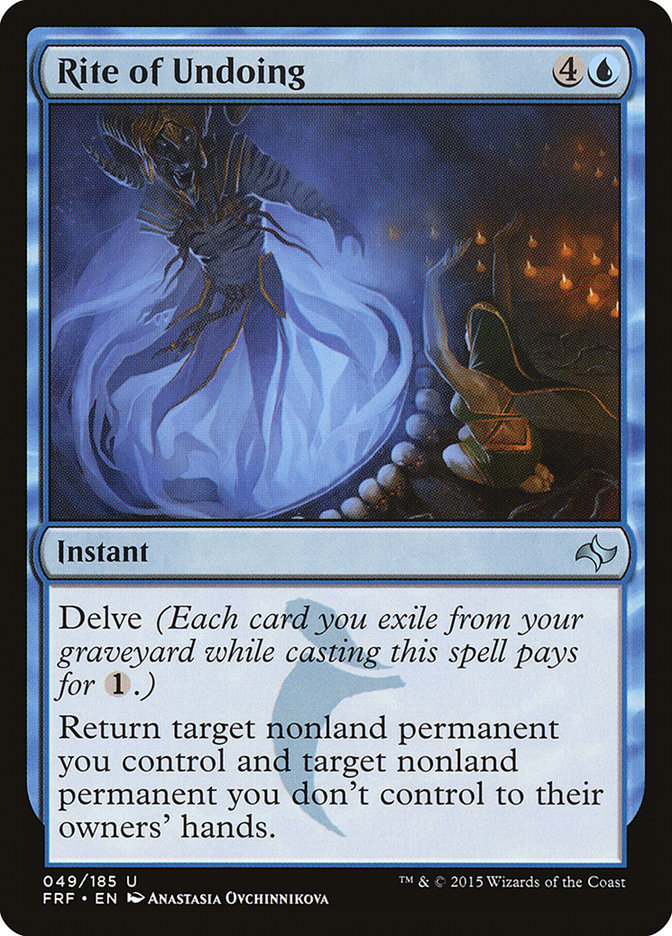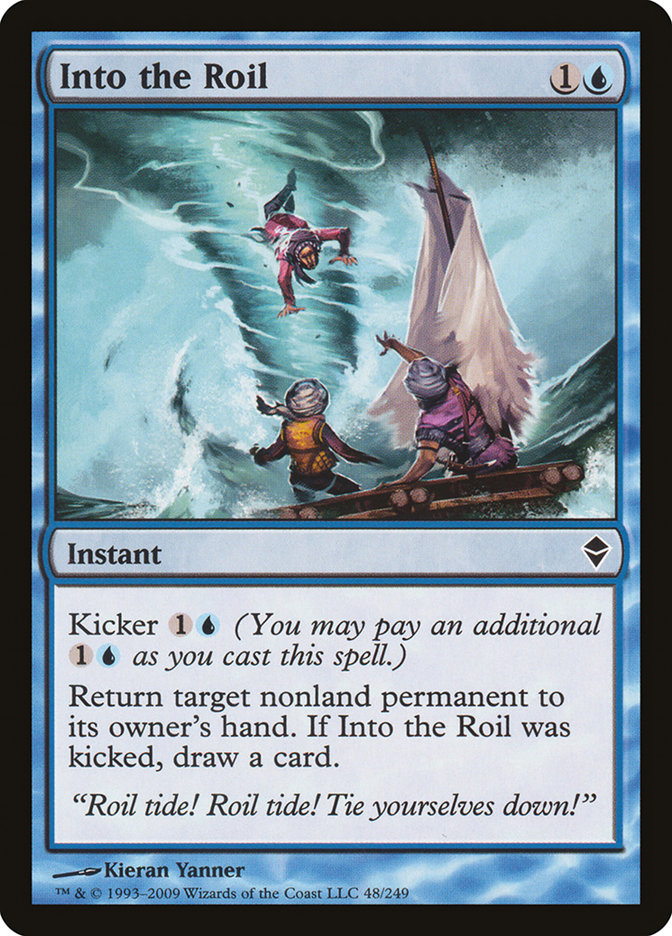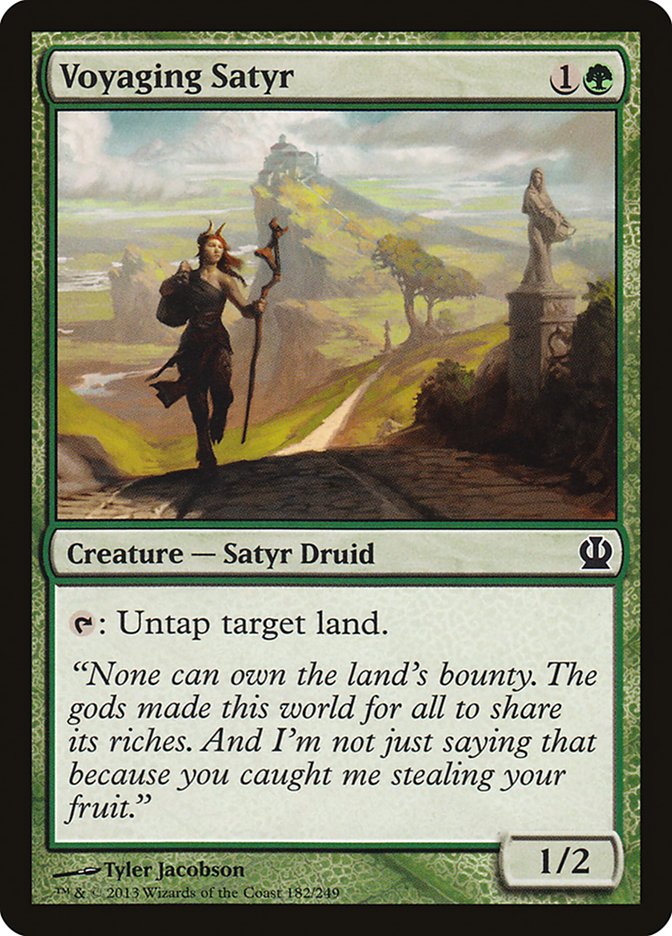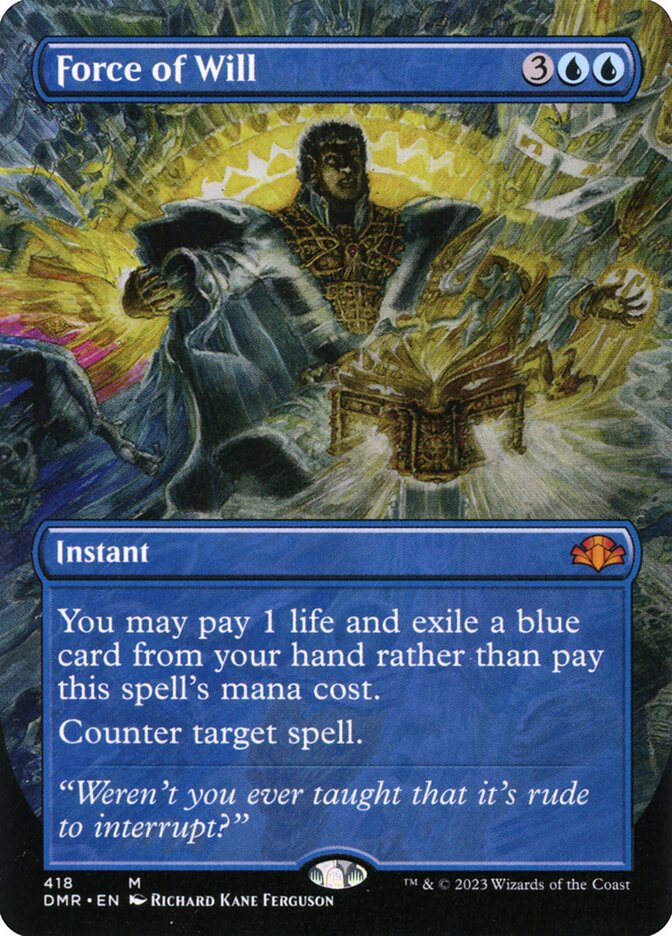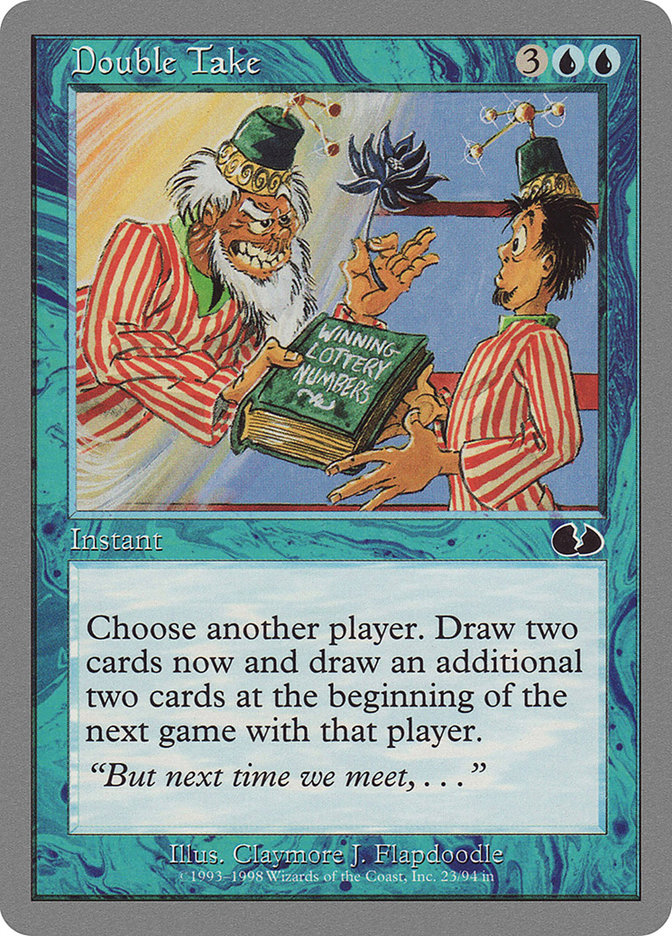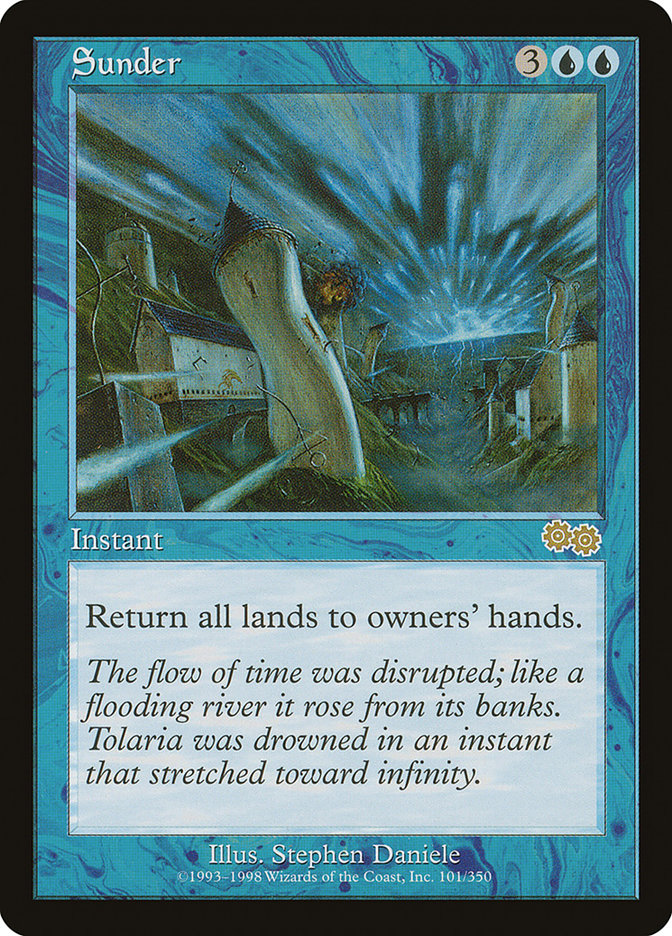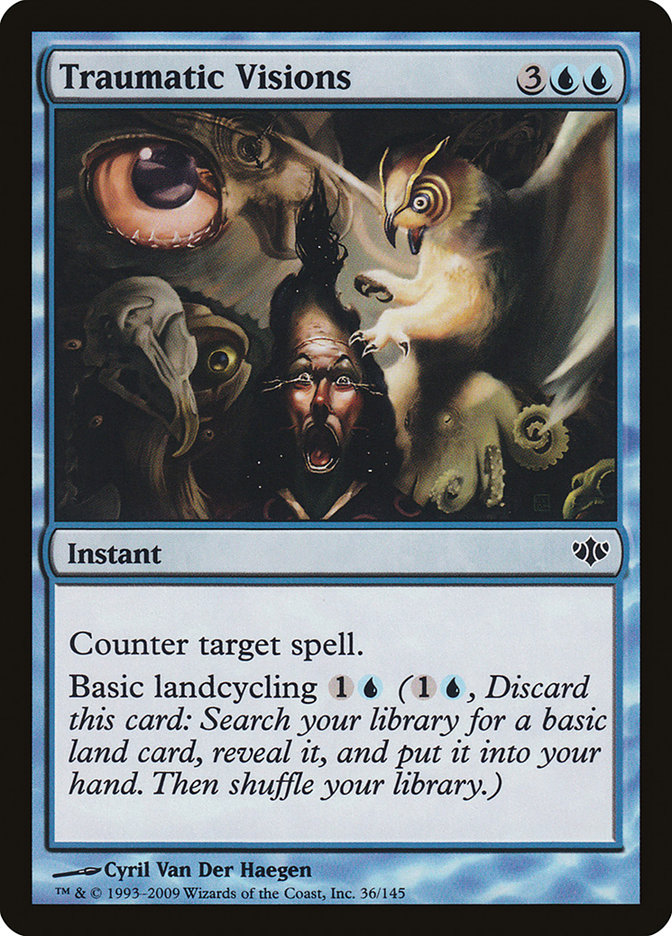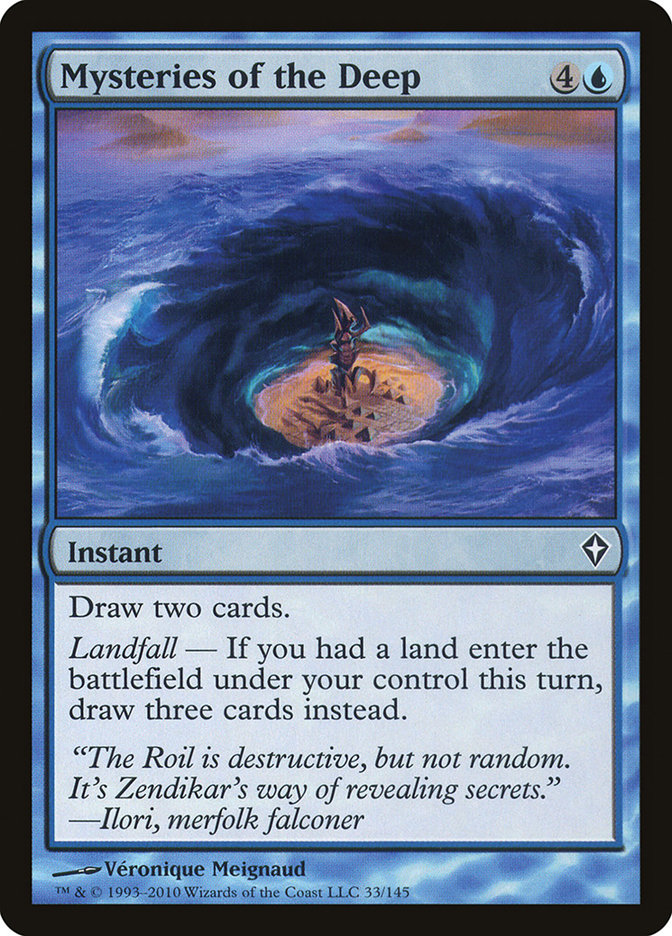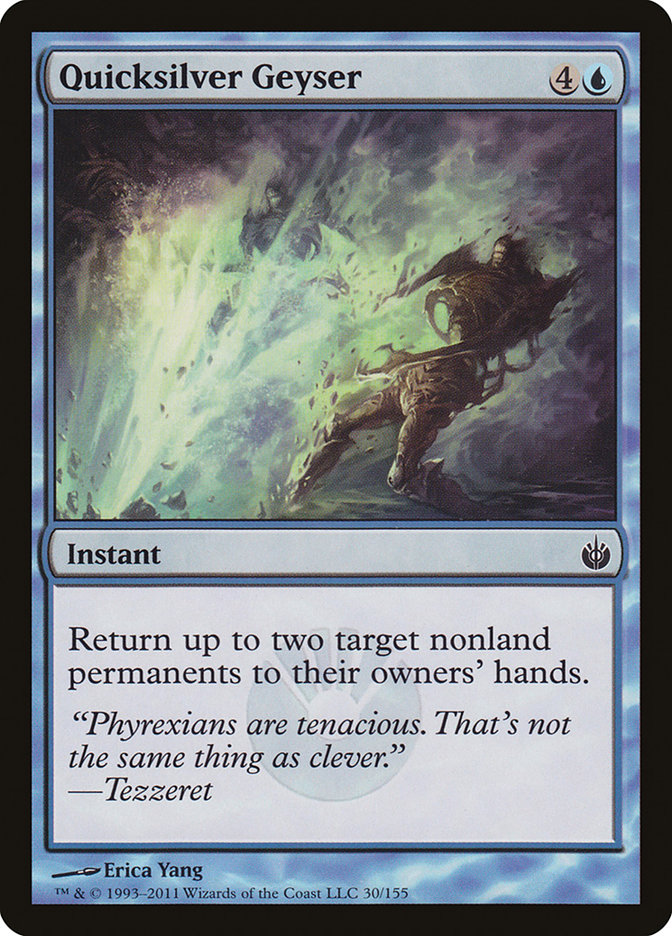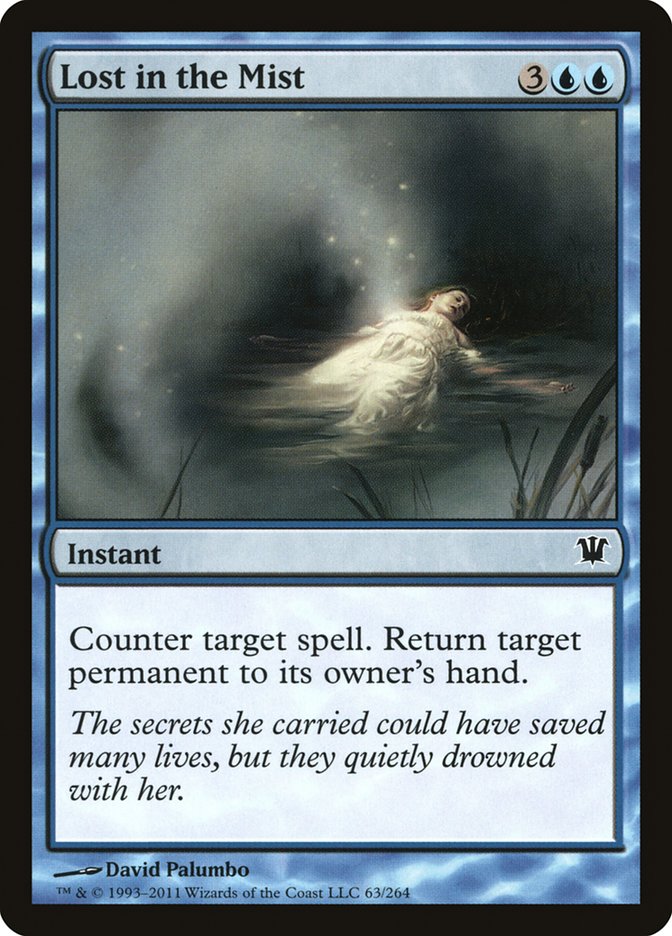Rite of Undoing MTG Card
| Mana cost | |
| Converted mana cost | 5 |
| Rarity | Uncommon |
| Type | Instant |
| Abilities | Delve |
| Released | 2015-01-23 |
| Set symbol | |
| Set name | Fate Reforged |
| Set code | FRF |
| Number | 49 |
| Frame | 2015 |
| Layout | Normal |
| Border | Black |
| Illustred by | Anastasia Ovchinnikova |
Text of card
Delve (Each card you exile from your graveyard while casting this spell pays for .) Return target nonland permanent you control and target nonland permanent you don't control to their owners' hands.
Cards like Rite of Undoing
Rite of Undoing is an intriguing spell in Magic: The Gathering that shares similarities with other bounce effects within the game. Much like Into the Roil, Rite of Undoing can return target nonland permanent to its owner’s hand. While Into the Roil can be cast for two mana or kicked for four to also draw a card, Rite of Undoing stands out for its delve ability, which allows a player to potentially reduce its five mana cost by exiling cards from their graveyard.
Another card with comparable functionality is Voyaging Satyr. Although it doesn’t affect the battlefield directly like Rite of Undoing, the Satyr enables untapping of lands, which can be a strategic move for tempo plays. However, Rite of Undoing offers more direct interaction by directly affecting the board state and potentially providing a considerable tempo swing.
Selecting the correct spell for your deck requires considering the strategic implications of each. Rite of Undoing can be a powerful inclusion, particularly in decks that fill the graveyard quickly and can leverage its delve mechanic for maximum efficiency and a potential surprise turnaround during a tense match.
Cards similar to Rite of Undoing by color, type and mana cost
Card Pros
Card Advantage: Rite of Undoing offers a prime opportunity to balance your hand by bouncing a nonland permanent to its owner’s hand. This can disrupt your opponent’s plays or return a valuable permanent of yours for reuse, ultimately fostering card advantage on the battlefield.
Resource Acceleration: In decks where permanents can be replayed or where creatures enter the battlefield with beneficial effects, this card can be a catalyst. It sets the stage for re-triggering enter-the-battlefield effects, essentially accelerating your resource utilization without losing card economy.
Instant Speed: The ability to cast Rite of Undoing at instant speed provides crucial tactical flexibility. You can respond to your opponent’s moves, surprise them by undoing a key play at a pivotal moment, or simply make an advantageous move before the turn passes, all without having to commit to your own turn.
Card Cons
Discard Requirement: Rite of Undoing requires you to exile a blue card from your hand; this is a steep price to pay and can lead to a decrease in hand advantage, putting you at a potential deficit against your opponent.
Specific Mana Cost: The casting cost of Rite of Undoing is not only color specific, but it also includes blue mana, which means that it’s not universally flexible and requires a dedicated blue mana base to play effectively.
Comparatively High Mana Cost: With its cost sitting at four mana, which includes three generic and one blue, Rite of Undoing is competing with numerous other spells in that mana range. Many alternatives either offer a more impactful effect or do not come with the additional cost of exiling a blue card.
Reasons to Include in Your Collection
Versatility: Rite of Undoing boasts adaptability in various deck builds that value responsiveness and interaction. This card offers flexibility, allowing players to bounce both their own permanents and those of an opponent, perfect for on-the-fly strategy adjustments.
Combo Potential: As an instant with the Delve mechanic, Rite of Undoing can fit into strategies designed to maximize the benefit of cards in the graveyard. It can synergize seamlessly with a deck’s overarching strategy of self-mill or graveyard manipulation, further expanding your tactical possibilities.
Meta-Relevance: Particularly in a meta heavy with Auras, Equipment, and other permanent types that players want to keep or replay, Rite of Undoing provides an edge. Its ability to disrupt opponent setups while protecting your own assets from removal can pivots games to your favor.
How to beat
Rite of Undoing is a versatile card from Magic: The Gathering that offers the ability to bounce a nonland permanent to its owner’s hand. The unique aspect of Rite of Undoing lies in its Delve mechanic, which allows a player to exile cards from their graveyard to help pay for the spell’s mana cost. This can turn a late-game graveyard into a resource, potentially casting this spell for a single blue mana.
To effectively counter Rite of Undoing, it’s crucial to limit the opponent’s graveyard resources which fuel the Delve mechanic. Strategies such as employing graveyard hate cards that exile or restrict graveyard interaction can stifle the spell’s efficiency. Additionally, maintaining a diverse and resilient board state makes the temporary setback of having a permanent returned to hand less impactful. Counterspells are also a direct way to prevent Rite of Undoing from resolving, ensuring your board presence remains untouched.
Understanding the intricacies of Rite of Undoing’s strengths and weaknesses allows players to anticipate and neutralize the spell’s influence on the game. By keeping the opponent’s graveyard in check and protecting significant threats, the advantage gained from casting this tricky spell can be mitigated.
Where to buy
If you're looking to purchase Rite of Undoing MTG card by a specific set like Fate Reforged, there are several reliable options to consider. One of the primary sources is your local game store, where you can often find booster packs, individual cards, and preconstructed decks from current and some past sets. They often offer the added benefit of a community where you can trade with other players.
For a broader inventory, particularly of older sets, online marketplaces like TCGPlayer, Card Kingdom and Card Market offer extensive selections and allow you to search for cards from specific sets. Larger e-commerce platforms like eBay and Amazon also have listings from various sellers, which can be a good place to look for sealed product and rare finds.
Additionally, Magic’s official site often has a store locator and retailer lists for finding Wizards of the Coast licensed products. Remember to check for authenticity and the condition of the cards when purchasing, especially from individual sellers on larger marketplaces.
Below is a list of some store websites where you can buy the Rite of Undoing and other MTG cards:
 BUY NOW
BUY NOW BurnMana is an official partner of TCGPlayer
- eBay
- Card Kingdom
- Card Market
- Star City Games
- CoolStuffInc
- MTG Mint Card
- Hareruya
- Troll and Toad
- ABU Games
- Card Hoarder Magic Online
- MTGO Traders Magic Online
See MTG Products
Legalities
Magic the Gathering formats where Rite of Undoing has restrictions
| Format | Legality |
|---|---|
| Commander | Legal |
| Legacy | Legal |
| Modern | Legal |
| Oathbreaker | Legal |
| Vintage | Legal |
| Duel | Legal |
| Pioneer | Legal |
| Penny | Legal |
Rules and information
The reference guide for Magic: The Gathering Rite of Undoing card rulings provides official rulings, any errata issued, as well as a record of all the functional modifications that have occurred.
| Date | Text |
|---|---|
| 2014-11-24 | Because delve isn’t an alternative cost, it can be used in conjunction with alternative costs. |
| 2014-11-24 | Delve doesn’t change a spell’s mana cost or converted mana cost. For example, the converted mana cost of Tasigur’s Cruelty (with mana cost ) is 6 even if you exile three cards to cast it. |
| 2014-11-24 | You can’t exile cards to pay for the colored mana requirements of a spell with delve. |
| 2014-11-24 | You can’t exile more cards than the generic mana requirement of a spell with delve. For example, you can’t exile more than five cards from your graveyard to cast Tasigur’s Cruelty. |
| 2014-11-24 | You exile cards from your graveyard at the same time you pay the spell’s cost. Exiling a card this way is simply another way to pay that cost. |
